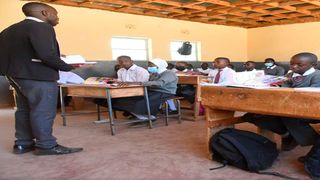
A teacher takes Junior Secondary School students through an English lesson in Uasin Gishu on February 13.
| Jared Nyataya | Nation Media GroupEducation
Premium
Thousands of headteachers face demotion in CBC plan
Thousands of non-graduate primary school heads face demotion in January when reforms proposed by the Presidential Working Party on Education Reforms (PWPER) are implemented.
Under the guidelines, headteachers of primary schools hosting Junior Secondary School (JSS) at the time of implementing the Competency Based Curriculum (CBC) are to head them for an interim period that lapses on December 30, 2023.
The PWPER proposes the creation of Comprehensive Schools that will incorporate the current pre-school, primary school and JSS in the same compound under a single headteacher.
There are more than 23,000 public primary schools in Kenya, most approved by the Ministry of Education to host JSS.
The Teachers Service Commission (TSC) and the ministry will be mandated to come up with guidelines on senior teachers who will work under the head.
Current headteachers who will not qualify for headship of the comprehensive schools are expected to be given lesser roles.
They will, therefore, lose control of school operations and funds.
Some schools have been operating without substantive heads as the commission failed to attract applicants for the administrative positions.
The positions have been advertised since December 2022.
Teachers unions blame the commission for the situation, arguing that thousands of tutors have stagnated in the same job groups and therefore do not qualify for promotion to the administrative positions.
The placement of JSS in primary schools was recommended by the PWPER in December last year and began in January 2023, in a reversal of the earlier intention by the Jubilee administration.
JSS comprises Grade 7, 8 and 9. The recommendations by the reforms team are expected to be implemented over two years, while the implementation of some has begun.
According to the draft PWPER report that is to be launched by President William Ruto next week, the head of the comprehensive school will be the accounting officer of all the sections under it.
Equally to change is the composition of the school Board of Management (BoM).
For now, the JSSs are managed by an interim sub-committee drawn from the primary school BoM.
The PWPER also proposes that members of the BoM not exceed nine or 10. It says the current boards are bloated.
In another proposal, the heads of the comprehensive and senior secondary schools will be agents of the Ministry of Education and not the TSC.
At the centre of the changes is the control of billions shillings channelled to schools.
There is a feeling that the ministry has no say on the usage of the funds since headteachers and principals are employees of the TSC, which is an independent constitutional commission.
The PWPER proposals will see the ministry gain much of the control it lost after the promulgation of the 2010 Constitution.
Previously, the commission used to operate under the ministry.
Prime Cabinet Secretary, Musalia Mudavadi, hinted at the looming changes when he launched the 2023-2027 TSC Strategic Plan at the Kenya School of Government on Thursday.
“I understand there have been differences of opinion between the TSC, teachers and parents over whether there has been effective teacher re-orientation on CBC and the quantity of teachers required for its effective implementation,” Mr Mudavadi said.
“Separately, the TSC has issues with the parent ministry on who should appoint school heads. Pending the report of the task force on CBC, nothing stops us from talking with each other and feeding the task force with consensus position ideas. I firmly believe that if you choose to criticise, do so while offering an alternative. Don’t condemn. Have the candour to offer solutions.”
The draft reforms report also takes away the quality assurance function of the TSC and consolidates it with the Directorate of Quality Assurance and Standards at the ministry.
It, therefore, means that the TSC budget for the function will be transferred to the ministry.
The directorate at the ministry, which was formerly known as the inspectorate, has in recent years been poorly staffed and is often overshadowed by the one at the commission.
The proposed changes will see TSC mainly left with the human resource function of registering, hiring, promoting and transfer of teachers.
TSC has been in charge of teachers’ discipline but the Prof Raphael Munavu team wants that handled by an independent agency.
To further strengthen accountability over funds sent to schools, the report proposes to transfer the audit function from the ministry to the Auditor-General’s office.
The team also proposes that government bursary and scholarships for basic education be under one roof to ensure accountability and equity. The Jomo Kenyatta Foundation will be restructured for this function.
The parastatal, which offers scholarships from funds mainly generated from its publishing arm, will exit the industry.
The Kenya Literature Bureau will become the only commercial publisher owned by the government.





